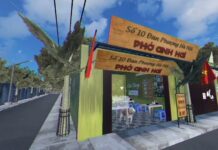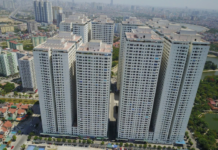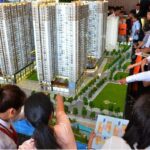On May 24, during a discussion in the National Assembly’s corridors, Mr. Trinh Xuan An, a permanent member of the National Defense and Security Committee, shared his thoughts on a tragic fire incident that occurred in Trung Kinh, Hanoi, claiming the lives of 14 individuals with one person still in critical condition.
Authorities Need to Take Stern Measures
Mr. An mentioned the National Assembly’s ongoing review of the Law on Fire Prevention, Fighting, and Rescue, stating that during the Committee’s deliberation on the law, he had emphasized the need to re-examine fire prevention regulations for residential buildings, especially those combining housing with business operations.
He pointed out the ever-present danger of fires in such dwellings, which could occur at any moment. The distinct characteristic of fires in residential areas, particularly those combining housing with business operations or accommodating laborers, students, and pupils, is the high potential for significant loss of life in the event of a blaze.

Mr. Trinh Xuan An, Permanent Member of the National Defense and Security Committee. Photo: Hoang Ha |
Analyzing the unique infrastructure conditions in areas like Trung Kinh (Cau Giay District) and Khuong Ha (Thanh Xuan District), where houses are located in alleys and small lanes, Mr. An acknowledged that while these conditions are natural and commonplace, they present significant challenges for firefighting efforts in the event of a blaze.
Regarding the synchronization of population management and infrastructure development, Mr. An suggested investing in social housing and rental housing for low-income earners. This solution deserves priority attention, but it remains an idea that has yet to be implemented, leaving tenants with no alternative but to rent accommodations in alleys and narrow lanes.
Highlighting the availability of ample land in Hanoi suitable for constructing rental housing for low-income individuals, Mr. An added that the Law on Housing and the Law on Real Estate Business already provide mechanisms to address this issue, but a more substantive approach is necessary.
Furthermore, prevention efforts should focus on raising public awareness about fire hazards. Given the limited capacity of authorities and specialized forces, it is impractical to expect them to monitor every household.
“All areas with a high concentration of laborers and workers in Hanoi, Ho Chi Minh City, and other major cities like Binh Duong, Dong Nai, and Bac Ninh must thoroughly inspect and scrutinize all such dwellings. Additionally, these areas should be equipped with fire extinguishers, and evacuation routes, including staircases and escape hatches, must be strategically arranged and clearly marked,” Mr. An recommended.
He emphasized the need for vigilance in fire prevention, especially in areas with houses located in alleys and narrow lanes, not just in Trung Kinh but throughout Hanoi. Therefore, authorities should conduct thorough inspections and raise awareness among residents to enhance fire prevention measures.
Moreover, Mr. An asserted that authorities must take stern action. If, during their inspections, they identify areas with a high risk of fire and explosions that threaten the safety of residents, they should mandate safety requirements regarding fire and explosion prevention.
In cases where buildings lack emergency exits, authorities should enforce compliance by compelling residents to remove obstacles and design additional escape routes.
To prevent tragic fires, a combination of short-term and long-term solutions, technical measures, and mandatory regulations is essential.
According to Mr. An, as the National Assembly is currently amending the Law on Fire Prevention, Fighting, and Rescue, it is crucial to dedicate a chapter or a section specifically to fire prevention in residential buildings, rather than merely including a simple provision as proposed in the draft.
“Regardless of the circumstances, the role and responsibility of individuals in fire prevention are of utmost importance. We must always remain vigilant about the dangers of fire and explosions, as the consequences of a fire can be devastating,” Mr. An emphasized.
Scrutinizing the Sale of Flammable Goods in Populated Areas
Mr. An also suggested implementing regulations for dwellings combining residential and commercial activities, requiring them to have fire prevention plans and measures to prevent the spread of fires.
He proposed more explicit regulations, such as prohibiting the combination of residential and commercial spaces and boarding houses accommodating a large number of people.
In the case of the Trung Kinh fire, the first floor of the building housed a vehicle repair shop, which posed a clear hazard. In such incidents, the primary danger to residents on the upper floors is smoke inhalation before the fire reaches them.
“Therefore, we must be unequivocal in our legal provisions and prohibit commercial activities in dwellings with a high number of occupants, as in the case of this boarding house,” Mr. An reiterated.
 The scene of the fire in Trung Kinh, Hanoi. Photo: Thach Thao |
Mr. An suggested that for cases like shophouses or street-front properties combining residential and commercial spaces, there should be more explicit fire prevention measures between floors, including fire-resistant partitions and on-site firefighting equipment in the commercial areas.
“While we may need to allow some time for people to adjust and stabilize their lives and businesses, I believe that, in the long run, we should prohibit this practice,” Mr. An repeated, emphasizing that this suggestion is not about “banning something that cannot be managed” but about mitigating risks to prevent fires that could result in loss of life.
Additionally, he advised scrutinizing regulations regarding the sale of flammable goods in populated areas. For instance, if a boarding house also stores flammable items like electric bicycles, foam, inflammable materials, chemicals, or other high-risk goods, more stringent fire prevention and firefighting conditions should be imposed.
Thu Hang




































